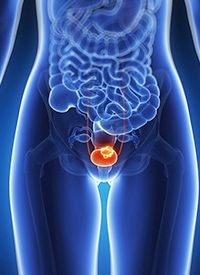Frontline Atezolizumab Receives NICE's Recommendation for Advanced Urothelial Cancer
The use of atezolizumab (Tecentriq) is being recommended by the UK's National Institute for Health and Care Excellence (NICE) for treatment-naïve patients with locally advanced or metastatic urothelial carcinoma who are not eligible for cisplatin-based therapy.
bladder

The use of atezolizumab (Tecentriq) is being recommended by the UK's National Institute for Health and Care Excellence (NICE) for treatment-naïve patients with locally advanced or metastatic urothelial carcinoma who are not eligible for cisplatin-based therapy.
Atezolizumab would be available for the Cancer Drugs Fund (CDF), but NICE is not recommending Roche’s PD-L1 inhibitor for routine National Health Service (NHS) use. The committee determined that the incremental cost-effectiveness ratio for atezolizumab is higher than what is usually considered a cost-effective use of NHS resources, even for end-of-life treatments.
The CDF is designed to make promising cancer drugs available to patients before they are fully approved for use in the NHS.
The recommendation is based on data from the single-arm phase II IMvigor210 trial, which included a treatment-naïve cohort of 123 patients with cisplatin-ineligible locally advanced or metastatic urothelial carcinoma enrolled at 47 locations in North America and Europe from June 9, 2014, to March 30, 2015. Patients received 1200 mg of atezolizumab IV every 3 weeks until progression. The primary endpoint was objective response rate (ORR), with secondary outcomes measures including progression-free survival and overall survival.
Among the 123 patients, 119 received at least 1 dose of atezolizumab. The (ORR) with atezolizumab was 23.5% (28/119; 95% CI, 16.2-32.2), including a complete response (CR) rate of 6.7%.
The median duration of response was not yet reached. Among patients with PD-L1 expression ≥5% (n = 32), the ORR was 28.1% (95% CI, 13.8-46.8), including a CR rate of 6.3%. In patients with PD-L1 expression <5%, the corresponding rates were 21.8% (95% CI, 13.7-32.0) and 6.9%, respectively.
The most common grade 3/4 adverse events (AEs) included fatigue (8%), urinary tract infection (5%), anemia (7%), diarrhea (5%), increase in the level of creatinine in the blood (5%), increase of the liver enzyme alanine transaminase (4%), hyponatremia (15%), decreased appetite (3%), and back/neck pain (3%).
AEs led to 5 patients discontinuing treatment. Five patients died, due to sepsis, cardiac arrest, myocardial infarction, respiratory failure, and respiratory distress. An additional patient had inflammation of the brain due to the herpes simplex virus and disease progression at the time of death.
NICE was concerned that, although atezolizumab was well tolerated, it is difficult to draw conclusions about the relative safety profile of the drug because there are no comparative clinical trial data. The committee concluded that the ongoing phase III IMvigor 130 trial would provide more data on the AEs associated with atezolizumab.
The IMvigor 130 trial is examining atezolizumab alone and in combination with chemotherapy versus chemotherapy alone in patients with untreated locally advanced or metastatic urothelial carcinoma. The data collection period is expected to end in December 2020, when the final analyses of the IMvigor 130 trial will be available.
Once those data are available, atezolizumab will enter the process for exiting the CDF and a review of the NICE guidance will start. Oncotherapy drugs are only available through the CDF for a limited period.
Reference:
Balar AV, Galsky MD, Rosenberg JE, et al. Atezolizumab as first-line treatment in cisplatin-ineligible patients with locally advanced and metastatic urothelial carcinoma: a single-arm, multicentre, phase 2 trial. Lancet. 2017;389(10064):67-76.
Study Shows Desire for Bladder-Sparing Treatments in High-Risk NMIBC
April 2nd 2024In an interview with Targeted Oncology, Joseph M. Jacob, MD, discussed how bladder preservation is the top reason for refusal of radical cystectomy in the TAR-200 monotherapy cohort of the SunRISe-1 study.
Read More